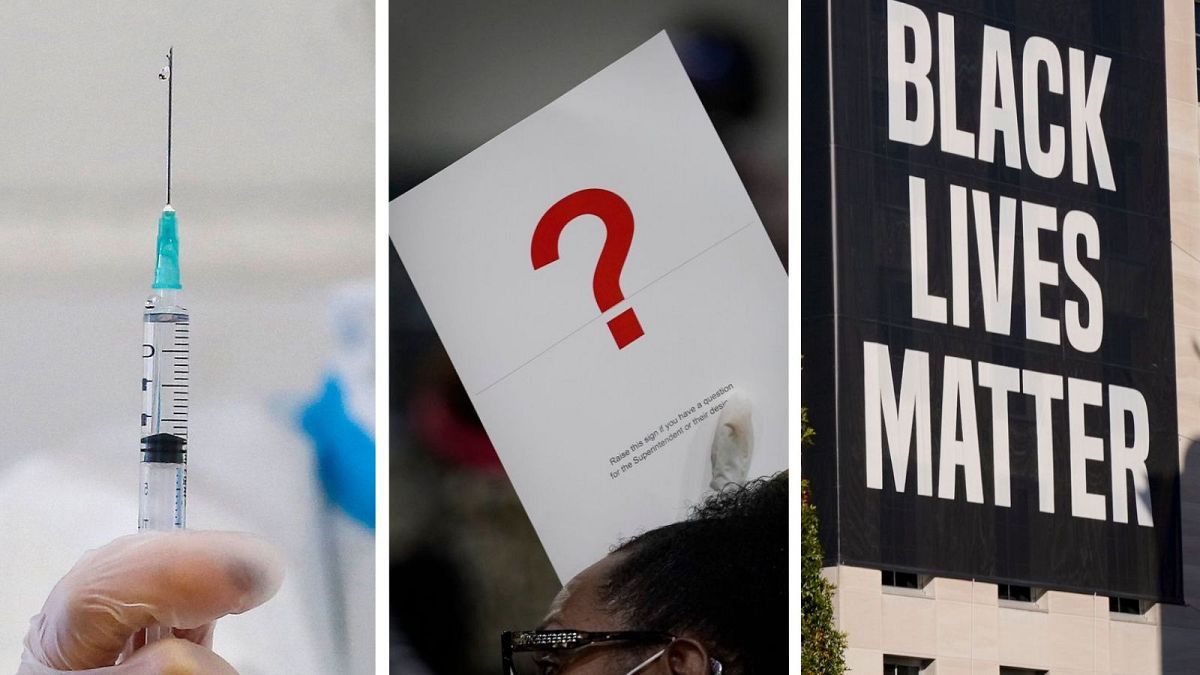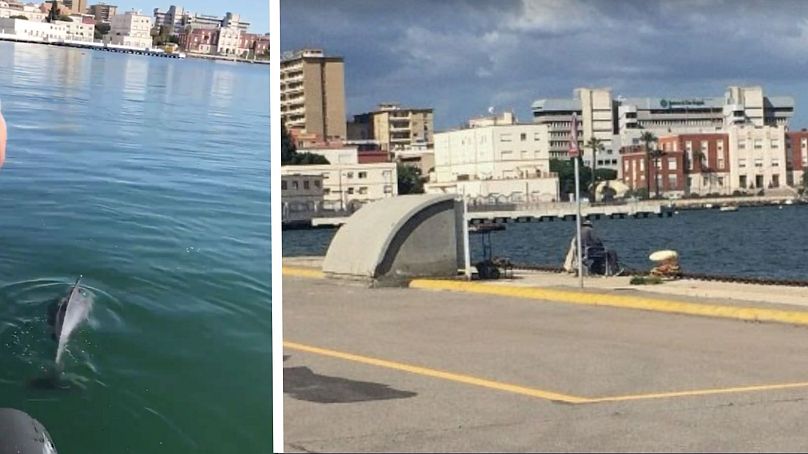Viral misinformation surged online in 2020. Here are ten of Euronews' best debunks from the last 12 months.
In an unprecedented year of news, false information and misleading rumours have spread rapidly across the internet.
Euronews' social media newsdesk, The Cube, has been fact-checking and debunking misinformation throughout 2020.
From fake COVID cures to false claims about dead voter ballots being used in the US election, here are some of the highlights.
1. Lemon in hot water is not a 'cure' for COVID-19
"We’re not just fighting an epidemic; we’re fighting an infodemic."
They were the words of the Director-General of the World Health Organization (WHO), Dr Tedros Adhanom Ghebreyesus in February.
As countries across the world were placed into lockdown in the spring, false messages from unidentified "experts" spread across social media in every language.
Some anonymous posts claimed that mixing lemon and baking soda with hot tea would "immediately kill" the coronavirus.
However, scientific studies have found the virus has a high range of stability at the pH levels of this mixture, and that it is dangerous to attempt to alter the pH levels of your blood.
2. Listerine is not an effective disinfectant
In April, a widely circulated social media post claimed to show an "excellent summary" by Johns Hopkins University in the United States, about how to prevent COVID-19 infection. However, the post was full of misinformation.
"This is not something produced by Johns Hopkins Medicine," the university said. "We do not know the origin [of these rumours] and they lack credibility."
One of the false claims suggested that Listerine, an American brand of antiseptic mouthwash, could be used as a disinfectant.
Both the European Centres for Disease Prevention and Control (ECDC) and the US Centre for Disease Control (CDC), stated that very specific concentrations of biocidal products are needed to disinfect surfaces.
3. Alcohol does not 'boost the immune system'
As northern Italy became the epicentre of the COVID-19 pandemic, false rumours surged on messaging platforms like Telegram and WhatsApp, encouraging people to drink alcohol to "boost the immune system".
But speaking to Euronews, the Italian Health Ministry reiterated that "alcohol consumption does not protect against COVID-19 and does not prevent one getting infected with the new coronavirus".
"On the contrary, the risk of infection is greater because alcohol weakens the immune system and therefore reduces the body's ability to cope with infectious diseases," the Ministry added.
Authorities in Italy and other European countries took action against this kind of misinformation by joining social networks to provide accurate updates on the health crisis and debunk false myths.
4. Satellite images did not show corpses being burned in Wuhan
As COVID-19 cases first began to spread across Europe, false claims alleged that China was "burning the evidence" of COVID-19, supposedly to cover up the scale of infection in the country.
A number of UK tabloid newspapers published satellite images that they suggested was evidence of corpse burning in cities like Wuhan and Chongqing, given high levels of sulphur dioxide (SO2).
But there is no evidence that supports the allegations of unusual crematorium activity, a claim that China's Ministry of Ecology and Environment described as a "serious distortion".
According to WHO, the main human source of SO2 emissions is the combustion of sulphur-containing fossils for domestic heating, electricity generation or motor vehicles, and multiple experts consulted by Euronews believe the levels observed in China are not particularly alarming in one of the world's most polluted countries.
5. White supremacists were not stealing ATMs in the United States
After the death of George Floyd in police custody in Minneapolis in May, demonstrations against social injustice spread across the world. So did viral misinformation.
One clip on Twitter claimed that a white supremacist had stolen an ATM in the United States and tried to board a bus. The tweet included a hashtag referring to Antifa, a protest movement that opposes fascism, white supremacists and racism.
A special investigation by the Cube found that this video was dated to 2019, and instead showed an attempted prank in New Jersey.
6. Washington DC did not experience a blackout during Black Lives Matter protests
As demonstrations grew in support of the Black Lives Matter movement, thousands of social media users shared the hashtag #dcblackout.
The claims falsely alleged that Washington DC had experienced an outage of internet and cellular communications during the protests, supposedly to allow violent police action to go unreported.
However NetBlocks, an organisation that monitors global internet connectivity, found "no indication of a mass-scale internet disruption" in the US capital, and journalists in the city reported no widespread communications disruption.
Euronews found that many social media accounts promoting #dcblackout claims seemed to exhibit bot-like behaviour and could have been created for the purpose of spreading disinformation.
7. Winston Churchill's photo was not removed by Google
In 2020, intense debate gripped Europe over the removal of statues and monuments dedicated to figures of the past.
In the UK, viral tweets falsely suggested that Google had removed an image of former British Prime Minister Winston Churchill.
Google, however, released a lengthy statement saying that Churchill's absence on the search engine alongside past prime ministers was "not purposeful".
In late April, the company had received feedback that his image was not "representative", and Google's systems had automatically displayed a younger and less recognisable Winston Churchill.
8. Joe Biden did not tell US citizens that they can "only re-elect Donald Trump"
As campaigning intensified ahead of the 2020 US Presidential election, Donald Trump's White House shared a misleading video on social media.
Democrat nominee Joe Biden was shown apparently telling a crowd in Kansas City that "we can only re-elect Donald Trump."
However, the video had been shortened to remove the end of Joe Biden's sentence - misleading online viewers.
In its entirety, Biden stated that "we can only re-elect Donald Trump if in fact we get engaged in this circular firing squad here. It's got to be a positive campaign."
9. Baseless claims that dead voter ballots led to a fraudulent US election result
Soon after the result was announced, viral claims falsely suggested that US citizens cast extra votes in key swing states by using the identities of "dead people".
US President Donald Trump has continued to assert - without evidence - that the election was 'rigged' and undermined by voter fraud. US state officials have repeatedly denied these claims.
Multiple experts told Euronews that if there were irregularities on individual voter ballots, they would not have affected the election result.
There are also multiple reasons why some voters can be registered with unusually old birth dates and appear to be "dead", including software errors and voter confidentiality issues.
10. No evidence to support the QAnon conspiracy theory
For many analysts, 2020 will be known as the year when baseless conspiracy theories became commonplace on social networks.
One unfounded theory that spread across Europe was QAnon. It's the belief that US President Donald Trump is waging a secret war against an alleged child-trafficking ring involving Satan-worshipping Democrats, Hollywood celebrities and billionaires.
Another baseless claim drew an unfounded link between pricey cabinets made by the furniture company Wayfair and the human trafficking of missing individuals in the US.
In a special edition of The Cube, Euronews examined how these false theories can be amplified online, even when there is no evidence to support them.
And finally ...
While the COVID-19 lockdown left European streets empty of tourists, several videos were shared online claiming to show dolphins appearing in Venice’s canals.
Sadly, however, the videos were not from Venice and actually showed the mammals swimming in the Mediterranean port of Cagliari in Sardinia, around 750 kilometres away.
Dolphins in Italian port waters are "increasingly frequent", but the last sighting in the San Marco Basin was "three years ago", experts say.

